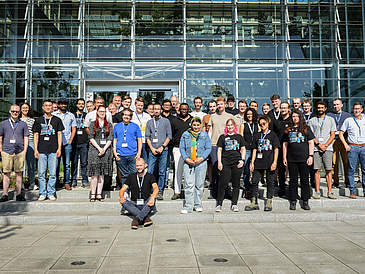In the week from September 11 to 15, it was time for the annual EASE Fall School again: Experienced researchers and industry partners provided insights into cognition-enabled robotics for everyday activities.
The EASE Fall School is an annual intensive one-week programme aimed specifically at young researchers interested in the field of cognition-enabled robotics. Lectures and interactive workshops provide knowledge and skills in AI and robot manipulation relevant to cognition-enabled everyday activity robotics. Within the framework of the EASE Academy, the Fall School makes an important contribution to the promotion of early career researchers.
A programme that brings together theory and practice
The aim of each Fall School is to combine theory and practice in a fruitful way, so that participants can put their newly gained knowledge directly into practice.
To this end, this year’s EASE Fall School once again offered its visitors a full and, above all, varied schedule: The mornings were filled with exciting presentations by invited international guests from research and industry.
In the afternoons, participants were able to gain active insights into EASE research: In hands-on sessions prepared by early career researchers of the institute, they had the opportunity to get to know different frameworks and to test methods of simulation, modelling and robot control.
At the end of each day, there was the opportunity to exchange ideas in an informal setting and to see a little of the city of Bremen during social activities such as a visit to the Becks brewery and a visit to UBICA Robotics.
Synergies with the Artificial Intelligence and Cognition Workshop
This year, the Fall School was held in parallel with the 9th International Workshop on Artificial Intelligence and Cognition (AIC), which took place on September 14 and 15.
By bringing together research in artificial intelligence, robotics and cognition, the EASE CRC aims to deepen the dialogue between the various disciplines beyond the boundaries of the respective events, not only in terms of subject matter, but also in terms of shared learning and networking.
Participants of both events had the opportunity to exchange ideas across events and participants of the Fall School were invited to present their research at the workshop. The conjunction of the two events, which ended in a joint farewell session on Friday, provided a lively exchange across disciplines.
All in all, there was a lot of positive feedback from the participants and the faculty, who once again found this Fall School to be very insightful and broadening.

